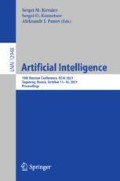Abstract
The paper develops an idea of fuzzy evidential classifiers based on modification of logistic regression model and Dempster–Shafer methodology. The proposed approach is integrating the additional linguistic variable into the classifier. This variable considers different shades of truth for class membership hypotheses and enriches available information for decision-making. It leads to identification of pre-failure states and detecting anomalies, inconsistency, and incorrectness in the initial data. As a result of the research, linguistic log-regression model is shown, and its components are justified. The inference procedure based on the model is illustrated. In the end, a simple example of implementation is also shown.
The work was supported by RFBR grants Nos. 19-07-00263, 19-07-00195, 19-08-00152, 20-07-00100, and 20-37-51002.
Access this chapter
Tax calculation will be finalised at checkout
Purchases are for personal use only
References
Levitin, A.V.: Restrictions on the Power of Algorithms: Decision Trees. Algorithms. Introduction to Development And Analysis, pp. 409–417. Williams (2006)
Wang, Z., Wang, R., Gao, J., Gao, Z., Liang, Y.: Fault recognition using an ensemble classifier based on Dempster–Shafer Theory. Pattern Recogn. 99, 107079 (2020)
Smets, P.: Belief functions: the disjunctive rule of combination and the generalized Bayesian theorem. Int. J. Approx. Reason. 9, 1–35 (1993)
Gong, C., Zhi-gang, S., Wang, P.-H., Wang, Q.: Cumulative belief peaks evidential K-nearest neighbor clustering. Knowl.-Based Syst. 200, 105982 (2020). https://doi.org/10.1016/j.knosys.2020.105982
Denoeux, T., Destercke, S., Cuzzolin, F., Martin, A.: Logistic regression revisited: belief function analysis. Belief Func.: Theory Appl. 11069, 57–64 (2018)
Magdalena, L.: Fuzzy systems interpretability: What, Why and How. In: Lesot, M.-J., Marsala, C. (eds.) Fuzzy Approaches for Soft Computing and Approximate Reasoning: Theories and Applications: Dedicated to Bernadette Bouchon-Meunier, pp. 111–122. Springer International Publishing, Cham (2021). https://doi.org/10.1007/978-3-030-54341-9_10
Kovalev, S.M., Dolgiy, A.I.: Interpretability of fuzzy temporal models. Adv. Intell. Syst. Comput. 874, 223–234 (2019)
Dempster, A.P.: Upper and lower probabilities induced by a multivalued mapping. Ann. Math. Stat. 38, 325–339 (1967)
Shafer, G.: A Mathematical Theory of Evidence. Princeton University Press, Princeton, N.J. (1976)
Denoeux, T.: Analysis of evidence-theoretic decision rules for pattern classification. Pattern Recogn. 30, 1095–1107 (1997)
Su, Z.-G., Wang, P.-H.: Improved adaptive evidential k-NN rule and its application for monitoring level of coal powder filling in ball mill. J. Process Control 19, 1751–1762 (2009)
Guettari, N., Capelle-Laiz´e, A.S., Carr´e, P.: Blind image steganalysis based on evidential k-nearest neighbors. 2016 IEEE International Conference on Image Processing, pp. 2742–2746 (2016)
Chen, X.-L., Wang, P.-H., Hao, Y.-S., Zhao, M.: Evidential KNNbased condition monitoring and early warning method with applications in power plant. Neurocomput. 315, 18–32 (2018)
Denoeux, T., Smets, P.: Classification using belief functions: the relationship between the case-based and model-based approaches. IEEE Trans. Syst. Man Cybern B 36, 1395–1406 (2006)
Appriou, A.: Probabilit´es et incertitude en fusion de donn´ees multisenseurs. Revue Scientifique et Technique de la D´efense 11, 27–40 (1991)
Denoeux, T.: A k-nearest neighbor classification rule based on Dempster-Shafer theory. IEEE Trans. Syst. Man Cybern. 25, 804–813 (1995)
Jiao, L., Pan, Q., Feng, X., Yang, F.: An evidential k-nearest neighbor classification method with weighted attributes. In: Proceedings of the 16th International Conference on Information Fusion, pp. 145–150 (2013)
Liu, Z.-G., Pan, Q., Dezert, J.: A new belief-based K-nearest neighbor classification method. Pattern Recogn. 46, 834–844 (2013)
Lian, C., Ruan, S., Denoeux, T.: An evidential classifier based on feature selection and two-step classification strategy. Pattern Recogn. 48, 2318–2327 (2015)
Lian, C., Ruan, S., Denoeux, T.: Dissimilarity metric learning in the belief function framework. IEEE Trans. Fuzzy Syst. 24, 1555–1564 (2016)
Su, Z.-G., Denoeux, T., Hao, Y.-S., Zhao, M.: Evidential K-NN classification with enhanced performance via optimizing a class of parametric conjunctive t-rules. Knowl.-Based Syst. 142, 7–16 (2018)
Denoeux, T.: A neural network classifier based on Dempster-Shafer theory. IEEE Trans. Syst. Man Cybern. A 30, 131–150 (2000)
Smets, P.: The canonical decomposition of a weighted belief. In: International Joint Conference on Artificial Intelligence, pp. 1896–1901 (1995)
Author information
Authors and Affiliations
Corresponding author
Editor information
Editors and Affiliations
Rights and permissions
Copyright information
© 2021 Springer Nature Switzerland AG
About this paper
Cite this paper
Dolgiy, A., Kovalev, S., Kolodenkova, A., Sukhanov, A. (2021). Logistic-Based Design of Fuzzy Interpretable Classifiers. In: Kovalev, S.M., Kuznetsov, S.O., Panov, A.I. (eds) Artificial Intelligence. RCAI 2021. Lecture Notes in Computer Science(), vol 12948. Springer, Cham. https://doi.org/10.1007/978-3-030-86855-0_19
Download citation
DOI: https://doi.org/10.1007/978-3-030-86855-0_19
Published:
Publisher Name: Springer, Cham
Print ISBN: 978-3-030-86854-3
Online ISBN: 978-3-030-86855-0
eBook Packages: Computer ScienceComputer Science (R0)

